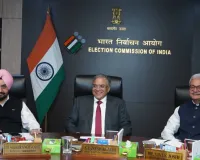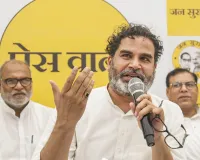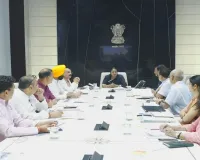'One border, three adversaries': Army Deputy Chief exposes Pakistan-China-Turkey nexus in Operation Sindoor

At a high-level defense event organized by FICCI on New Age Military Technologies, Lieutenant General Rahul R Singh, Deputy Chief of Army Staff (Capability Development & Sustenance), raised serious concerns over the growing military collaboration between Pakistan, China and Turkey. He emphasised the urgent need for India to strengthen its air defence and technological capabilities in light of modern warfare challenges witnessed during Operation Sindoor.
China gave Pakistan real-time intel on India's military vectors
Lt Gen Singh revealed that during Operation Sindoor, Pakistan was receiving live intelligence inputs from China, providing real-time updates on India's critical military deployments. "When DGMO-level talks were going on, Pakistan openly mentioned that they were aware that our important vectors were primed and ready for action. This intelligence was being fed to them directly from China," he stated.
He described the situation as a clear example of how Pakistan and China were coordinating in real time, posing a serious strategic challenge for India. "That is one area where we need to move fast and take appropriate action," he warned.
Turkey's involvement and drone warfare
Lt Gen Singh also highlighted the role played by Turkey, which provided significant support to Pakistan during the conflict. "Turkey also played an important role in providing the type of support it did. They supplied Bayraktar drones and several other unmanned aerial systems, along with trained individuals on the ground," he revealed.
The use of advanced drone technology by adversaries has added complexity to modern battlefields, further underscoring the need for India to advance its air defence systems.
One border, three adversaries: Pakistan, China and Turkey
Describing the evolving threat landscape, Lt Gen Singh pointed out that India was dealing with three adversaries on one border. "Pakistan was at the front, China was providing all possible support, and Turkey's involvement was evident," he said.
The Deputy COAS revealed that 81% of Pakistan's military hardware comes from China, effectively turning Pakistan into a testing ground for Chinese defence technology. "China is able to test its weapons against other weapons, so it's like a live lab available to them," he cautioned.
Air defence and lessons from Operation Sindoor
Lt Gen Singh stressed that air defence played a crucial role during the operation, but warned that next time, India's population centres could be targeted. "Air defence and how it panned out during the operation was important… This time, our population centres were not quite addressed, but next time, we need to be prepared for that," he added.
He called for the development of a robust, technologically advanced air defence system to deal with the growing threat of drones and modern warfare tactics.
Precision arikes and strategic messaging
Lt Gen Singh lauded the Indian Armed Forces for their precision strikes on terror infrastructure, highlighting the importance of strategic messaging and technological integration. "The planning and selection of targets was based on extensive data from technology and human intelligence. We identified 21 targets, of which nine were selected for engagement in the final hours," he said.
Tri-services approach and escalation control
The Deputy COAS praised the leadership for adopting a tri-services approach to send a clear message of India's military readiness. "It was a considered decision to demonstrate that we are an integrated force. The objective was to remain at the top of the escalation ladder and bring the conflict to a controlled end," he stated.
Concluding his address, Lt Gen Singh emphasised that while war is easy to start, it is difficult to control. He described the decision to stop the operation at the right time as a masterstroke by India's leadership.
Lt Gen Rahul R Singh's remarks serve as a stern reminder of the shifting regional security dynamics. With Pakistan receiving direct Chinese military assistance, Turkey's involvement, and advanced drone warfare on display, India faces new-age military challenges that demand swift technological advancements, particularly in air defence and strategic preparedness.
About The Author
Welcome to Aryan Age, an English newspaper that has been serving readers since 2011 from Delhi. With a loyal circulation of over 19,000, we are dedicated to providing our readers with the latest news and information, as well as insightful analysis and commentary that help them navigate the complex and rapidly changing world.










Comment List